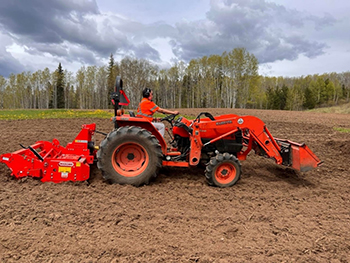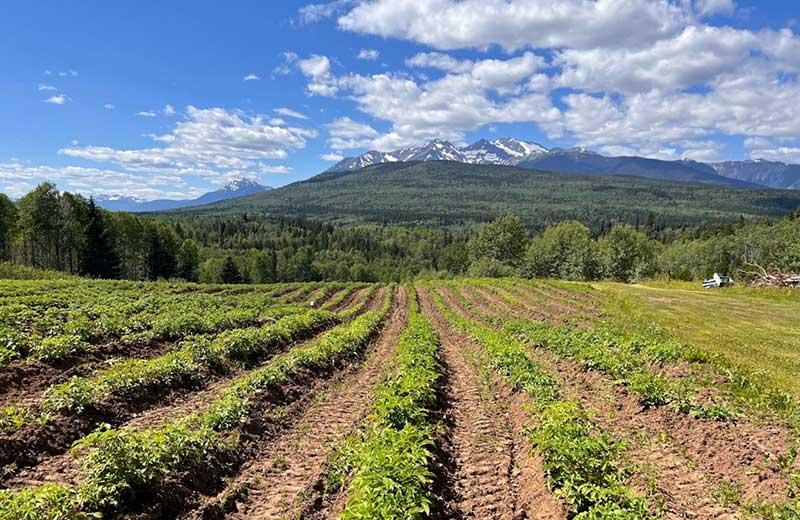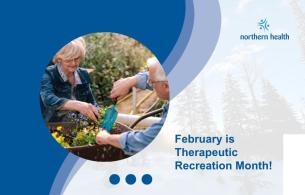In early 2022, Northern Health, in collaboration with the First Nations Health Authority, launched the new Rural, Remote and Indigenous Food Action Grant.
Six projects across the Northern Health region were awarded grants to fund their food security and Indigenous food sovereignty projects.
What types of projects were funded?
The Rural, Remote and Indigenous Food Action Grant supports communities to increase food security for all British Columbians, and especially those living with low incomes. Projects funded this year focused on one or more of the following areas:
Food security, simply put, is the ability to access enough safe and healthy food, at all times. It means that everyone has equal access to food that is affordable, culturally preferable, nutritious, and safe; everyone has the opportunity to participate in and influence food systems; and that food systems are resilient, ecologically sustainable, socially just, and honour Indigenous food sovereignty.
Food insecurity is when factors outsides an individual’s control negatively impacts their access to enough foods that promote well-being. Economic, social, environmental, and geographical factors influence this access. Food insecurity is most often felt by people who also experience the negative impacts of issues such as discrimination and ongoing colonial practices.
Indigenous food sovereignty is an essential element to addressing food security and food insecurity. It can only be defined by the community or individual practicing food sovereignty, and must be discussed in the context of actions and systems change.

Six projects funded in the North
Indigenous Food Sovereignty Association | Northern Indigenous Food Security and Sovereignty Initiative | $50,000
Funding provided support to purchase new farming equipment as well as expansion of an outdoor kitchen.
“This funding will contribute to long term food security projects in our local communities. One of the mandates of the IFSA is to help communities create long term food sovereignty initiatives that will be lasting and resilient. With solid funding in 2022, we will be able to train, teach, and plan with communities on their own food sovereignty goals. We will also be working closely with at least one of our First Nations partners in 2022 in their community to develop fallow land for long term food production.
The equipment purchased for farm expansion and community work in 2022 is projected to last at least 20-30 years under good maintenance. This equipment will provide long term benefits on a year-to-year basis and will be used continually through the years to cultivate food security for the North.”
Takla Nation | Takla Nation Food Security Initiative | $50,000
Funding provided support for hiring a Food Security worker as well as infrastructural upgrades to smokehouse and community garden.
“Takla is 5 hours from the nearest urban center by logging road, and as a result there are few sources of affordable and fresh foods available to residents. Intergenerational trauma in the community has led to challenges maintaining connections to traditional food gathering practices. To revive food sovereignty and increase food security, Takla would like to build a smokehouse, further enhance their community garden, and hire a dedicated Food Security Worker to coordinate both initiatives.
This food access project is intended to bring intergenerational learning opportunities to the community. Giving Elders and knowledge keepers the chance to practice and teach traditional food gathering practices will revive this knowledge for future generations of Takla residents.”
Populous Map | Community Deer Rack and Gathering Area | $13,000
Funding provided support for creation of community deer rack and outdoor gathering area.
“Our community deer rack meets the needs of a culturally safe, always available deer stand, and will also provide opportunities for folks to learn to hunt and clean sitka deer and other foods. There is a fire pit and physically accessible seating to encourage intergenerational gathering. The main health would be a chance to connect with one another on such an important process, discuss best practices, and pass information on to one another.”
Skeena Watershed Conservation Coalition | Tree-Generative Poultry Project | $31,115
Funding provided support of implementation and expansion of a program aiming to create a tree-generative system in the Upper Skeena.
“Our goal is to build a regenerative poultry system in the Upper Skeena system that is entirely self supported. This includes designing, testing and tweaking the (program) model, working with local farmers to raise the grains to feed the chickens, utilize the fertilizer produced by the chickens, support local farmers in the region to create a hatchery and mobile processing facility to be used by all Nations, communities and farmers that start their own commercial Tree-Generative farm in the Upper Skeena.”
Witset First Nation | Witset Food Security Plan | $45,405.50
Funding provided support to create a community food security plan.
"In recent years, major efforts have been made to reconnect to our traditional ways, which has helped our people heal from the effects of cultural genocide and residential schools. Through traditional practices such as berry picking, salmon harvesting our people are seeing dramatic changes in the environment that is affecting their ability to harvest food for their families. More and more community members are seeing a need to address these issues and the Witset Food Security Plan is the first step. It will create a 15 year strategy for our community to become food secure by understanding our current food consumption habits and the environmental trends including climate change.”
Nisga’a Valley Health Authority | Ax aay'in-Traditional Foods and Nutrition | $50,000
Funding provided support for community food education programs and facilitation.
“Within the Nisga’a food harvest calendar, we harvest, process and preserve foods and medicines year-round. We have smokehouse programs that run from March to November. February is moose and seafood, March and April are Oolican and sealion as well as other seafoods. May to September is salmon harvests, seafood, and berries. Our community gardens will start in May. For each season, we provide smokehouse space and teaching from Elders. Food will be harvested with families who do not have vehicles or boats. NVHA will be providing garden boxes in each community.”
The application intake for the Rural, Remote and Indigenous Food Action Grant opened on November 1, 2022 and runs until November 30, 2022. Apply now!














Comments